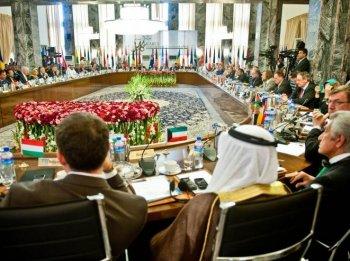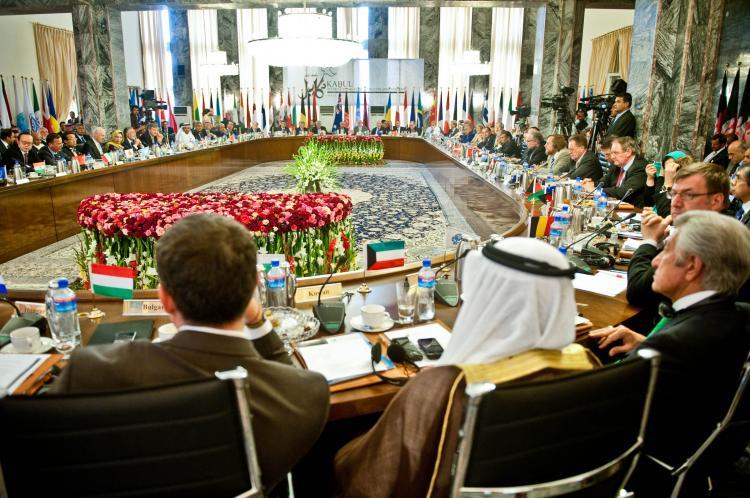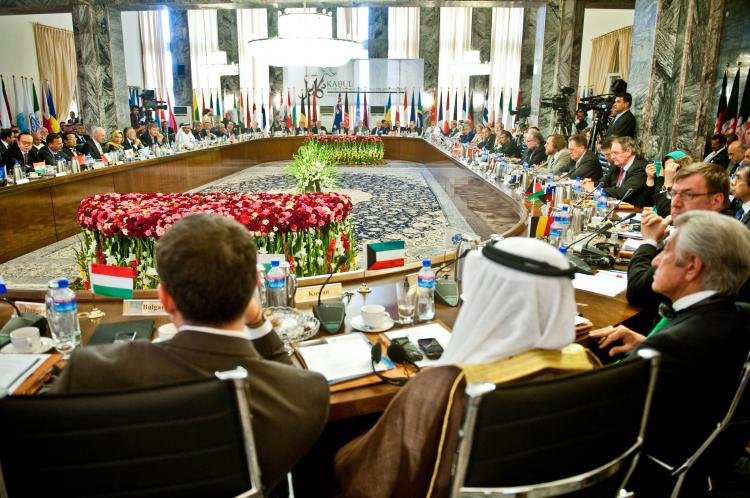Afghan President Hamid Karzai assured international officials at the world conference in Kabul Tuesday that he still plans to take charge of handling security throughout the nation by 2014.
“I remain determined that our Afghan national security forces will be responsible for all military and law enforcement operations throughout our country by 2014,” Karzai told the conference.
“Our goal is to transform the three organs of our national security forces into trusted national institutions dedicated to fulfilling their constitutional duty of ensuring the integrity and security of our country,” the Afghan president added.
Representatives from 70 countries attended the one-day conference in the Afghan capital of Kabul, including Secretary of State Hillary Clinton.
United Nations Secretary-General Ban Ki-moon, who co-hosted the conference, said that there had never been a more concrete vision for Afghanistan’s future and that the authorities must take responsibility for all that the country now faces.
“Let us also be clear—just as Afghans are taking greater responsibility for governance and development so must they take greater responsibility for security,” he said.
President Karzai leaves the conference with promises that his government will directly receive a greater percentage of foreign aid flowing into Afghanistan, up from 20 percent to 50 percent within the next two years. In exchange, his administration must agree to a transparent system of financial management to give potential donors more confidence.
Karzai, whose government has been accused of corruption, had previously lobbied for more than 50 percent.
President Barack Obama said in a joint press conference with British Prime Minister David Cameron in Washington on Tuesday, that the Kabul conference was a “major step forward,” hailing Karzai’s “concrete plans.”
“Agreement was reached on a plan in which responsibility for security in Afghan provinces will transition to Afghan security forces,” Obama said.
“Over the coming year, Afghans will begin to take the lead in security, and in July of next year, will begin to transfer—we will begin to transfer some of our forces out of Afghanistan.”
Cameron called withdrawing British troops by 2014 a “realistic” goal. After the United States, Great Britain has the largest number of combat forces in Afghanistan.
However, NATO Secretary-General Anders Fogh Rasmussen said that the handover of security duties to Afghan forces would be based on “conditions, not calendars.”
“Transition is a process and we need to train and educate more Afghan soldiers and more Afghan police,” Rasmussen said.
“We will not leave Afghanistan until we know for sure that the Afghans can take care of their own security,” he added.
Human rights groups such as Afghanistan Rights Monitor, say this year has been the worst year for civilians and international forces killed since the demise of the Taliban regime in late 2001. Taliban insurgents have also become “more resilient, multistructured and deadly,” reported ARM.
American and international forces experienced their deadliest month in June with over 100 soldiers killed, including 60 Americans.
Clinton also raised concern for women’s rights in Afghanistan. She discussed the issue with leaders among Afghan women before the conference began. The main concern is that peace plans that include dealing with the Taliban could jeopardize civil rights of many women in the country.
The United States is also under public pressure in the region to prove their commitment to the long-term development of the country beyond security matters.
On Tuesday, Afghanistan’s capital, Kabul was in a security lock-down because of fears of possible attacks during the meeting.
Associated Press reported that rocket fire at Kabul airport caused a plane carrying Ban Ki-moon and the Swiss foreign minister to be diverted.
“I remain determined that our Afghan national security forces will be responsible for all military and law enforcement operations throughout our country by 2014,” Karzai told the conference.
“Our goal is to transform the three organs of our national security forces into trusted national institutions dedicated to fulfilling their constitutional duty of ensuring the integrity and security of our country,” the Afghan president added.
Representatives from 70 countries attended the one-day conference in the Afghan capital of Kabul, including Secretary of State Hillary Clinton.
United Nations Secretary-General Ban Ki-moon, who co-hosted the conference, said that there had never been a more concrete vision for Afghanistan’s future and that the authorities must take responsibility for all that the country now faces.
“Let us also be clear—just as Afghans are taking greater responsibility for governance and development so must they take greater responsibility for security,” he said.
President Karzai leaves the conference with promises that his government will directly receive a greater percentage of foreign aid flowing into Afghanistan, up from 20 percent to 50 percent within the next two years. In exchange, his administration must agree to a transparent system of financial management to give potential donors more confidence.
Karzai, whose government has been accused of corruption, had previously lobbied for more than 50 percent.
President Barack Obama said in a joint press conference with British Prime Minister David Cameron in Washington on Tuesday, that the Kabul conference was a “major step forward,” hailing Karzai’s “concrete plans.”
“Agreement was reached on a plan in which responsibility for security in Afghan provinces will transition to Afghan security forces,” Obama said.
“Over the coming year, Afghans will begin to take the lead in security, and in July of next year, will begin to transfer—we will begin to transfer some of our forces out of Afghanistan.”
Cameron called withdrawing British troops by 2014 a “realistic” goal. After the United States, Great Britain has the largest number of combat forces in Afghanistan.
However, NATO Secretary-General Anders Fogh Rasmussen said that the handover of security duties to Afghan forces would be based on “conditions, not calendars.”
“Transition is a process and we need to train and educate more Afghan soldiers and more Afghan police,” Rasmussen said.
“We will not leave Afghanistan until we know for sure that the Afghans can take care of their own security,” he added.
Human rights groups such as Afghanistan Rights Monitor, say this year has been the worst year for civilians and international forces killed since the demise of the Taliban regime in late 2001. Taliban insurgents have also become “more resilient, multistructured and deadly,” reported ARM.
American and international forces experienced their deadliest month in June with over 100 soldiers killed, including 60 Americans.
Clinton also raised concern for women’s rights in Afghanistan. She discussed the issue with leaders among Afghan women before the conference began. The main concern is that peace plans that include dealing with the Taliban could jeopardize civil rights of many women in the country.
The United States is also under public pressure in the region to prove their commitment to the long-term development of the country beyond security matters.
On Tuesday, Afghanistan’s capital, Kabul was in a security lock-down because of fears of possible attacks during the meeting.
Associated Press reported that rocket fire at Kabul airport caused a plane carrying Ban Ki-moon and the Swiss foreign minister to be diverted.






